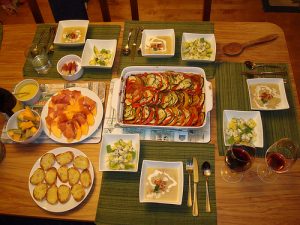 My generation is a practical generation, and I am challenged by my faith to be a practical person. Don’t get me wrong: I love all verbal and theological things: story, theology, politics, and history, perhaps even inordinately.
My generation is a practical generation, and I am challenged by my faith to be a practical person. Don’t get me wrong: I love all verbal and theological things: story, theology, politics, and history, perhaps even inordinately.
But I believe in places. I believe that relationships, rooted in love, transform us. And it just so happens that most lasting human relationships are formed around the table.
In the Eucharist, the ordinary is made sacred. The original Eucharist tradition as recorded in the book of Acts and later Paul was a feast that united people of all incomes and races in a common purpose.
The Eucharist gathers us at particular place, with a particular people, to eat particular food(s) together. While we believe theologically that Christ is present at the table with us, the Eucharist is more about what you do than what you believe.
The Eucharist is about gathering community and being together. It recognizes that gathering around the table is a sacred act. Our relationships expand from the table outwards into the world, teaching us how to love one another through the lens of table hospitality: as old as time itself, but intentionally sacred.
You may have guessed by now that I do not limit the Eucharist to Sunday morning. I believe that all of the foods we eat at our tables are sacred: not through their essential nature, but through the relationships that they represent: relationships between farmers and communities, relationships between food and bodies, food and the earth, and farms and our ecosystem. I believe Christ is present whenever two or more gather in his name.
The table is a place where we bypass rank and privilege and create a zone where you take what you need and bring what you are able. It is a commons where we are defined in new, equal relationships with one another, ensuring that all have enough and sharing. Believers in Acts took the idea of the common table even further and held all possessions in common, caring for the widows and dispossessed from the surplus, bypassing the inequality created by the currency stamped with the deified Caesar.
Our relationships are holy, and so they must be sustainable: wrought with great care for the integrity of communities and creation. Our tables are a microcosm of the way we live out our faith.
We know that hospitality is a sacred duty, as are all of our relationships within our economic system. A sacred relationship is one formed in love and rooted in mutual respect. It is therefore sustainable because it respects the health and integrity of all members of the relationship. God is calling all things into sustainability and right relation. Can you hear it?
Yes: this is practical. Abstract theology is safe, because it commits to nothing concrete, but theologies out of lived experiences of God present in community are dangerous because they invite the hearer to participate. Faith without works is dead.
So I will tell you how we are carrying out this theology. The Quixote Center’s Crabgrass Christians Initiative is organizing local church/farmer distribution relationships based loosely around the the Kentucky organization New Roots’ Fresh Stop model.
Our vision is to distribute in-season, local, wholesale, organic or near-organic fresh produce from churches to community and church members once every two weeks. People with higher incomes will pay more so that those with less will be able to afford it, restoring economic inequality in a small way.
We will teach classes at local churches that help us understand the holiness of food and table and the inequalities in our food system. These classes are designed to empower lay people to be leaders and carry out the work of the program.
In the long term, we will learn about our foods and tables by visiting farms and re-creating the local, particular relationships that have been broken by a globalized food production system that obscures the chemicals, unjust pricing systems, and unsustainable practices that dominate our grocery stores.
Yes, the Eucharist calls us to invest in a particular place, with particular people, in sustainable relationships. And this, my sisters and brothers, can challenge our basic assumptions about the make-up of our world by giving us a vision of what a restorative community looks like.
—-
Jeremy has been an activist ever since he accidentally ate the red pill instead of the more harmless blue one. He converted to Christianity while serving a six-month prison term for civil disobedience to close the School of the Americas. He blogs and tweets about faith. He is the coordinator of the Crabgrass Christians Initiative and one of the founders of The Occupy Church.

